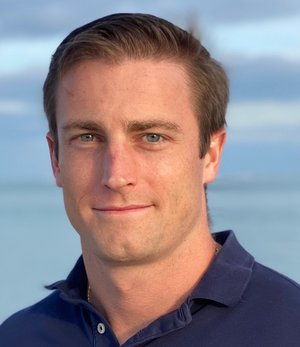Thomas Bardenwerper

His new novel is Mona Passage.
My Q&A with the author:
How much work does your title do to take readers into the story?Visit Thomas Bardenwerper's website, Facebook page, and Twitter perch.
The Mona Passage is the body of water that separates the Dominican Republic from Puerto Rico. On an almost daily basis, Cuban, Haitian, and Dominican migrants attempt to cross this stretch of water in search of better lives.
Pat McAllister is a US Coast Guard officer stationed in San Juan whose cutter patrols the Mona Passage for cocaine smugglers and migrants. His neighbor and best friend, Galán Betances, is a Cuban emigrant. Galán’s sister, Gabriela, is still in Cuba and at risk of being committed to a mental health facility.
The only way for Gabriela to live a full life is to cross the Mona Passage and join Galán in San Juan. Pat, who becomes caught up in this plan, must decide if he is willing to risk everything to unify a family.
Other titles I toyed with were Blood and Water, Gabriela, The Last Patrol, and Wet Foot, Dry Foot.
How surprised would your teenage reader self be by your new novel?
That’s a great question! First off, my teenage self would be surprised that I had written a novel at all. I enjoyed creative writing in high school but didn’t envision myself ever writing a book.
What would have been less surprising to my teenage self is the general subject matter of Mona Passage – specifically its Coast Guard elements and Latin American setting. While I knew almost nothing about the Coast Guard as a teenager, a military career had been in the back of my mind ever since my oldest brother had joined the Army. And in terms of Latin America, a trip I made across Cuba as a 16-year-old sparked my interest in the region, an interest that I have continued to pursue personally and professionally ever since.
Do you find it harder to write beginnings or endings? Which do you change more?
Endings. An ending is your readers’ last glimpse into the world that you created. If your story wraps up too neatly, it can be too easily forgotten. If the narrative arc is completely unresolved, readers will be angry. I tried to create an ending that was just unsettled enough that the story will stick with readers long after they put the book away.
For Mona Passage, I went through several iterations of an epilogue set during Hurricane María before bagging the effort altogether. First, although I lived in Puerto Rico before María and returned shortly thereafter to assist in the relief efforts, I was not there during the storm and didn’t feel like I could do it justice. Second, I feared that any epilogue would take away from the power of the final chapter’s last scene.
Do you see much of yourself in your characters? Do they have any connection to your personality, or are they a world apart?
There are obvious similarities between me and Pat – one of the two protagonists. Pat serves in the Coast Guard, thoroughly enjoys living in Puerto Rico, and values family above all else. But none of that means he is me.
Indeed, I struggled writing the character of Pat early on because I was modeling him too closely on myself. I had a hard time depicting his vulnerability or his mostintimate moments, moments that hit too close to home. I discussed this with my wife, and she suggested that I picture somebody else from my life when I wrote the Pat scenes, and sure enough the trick worked! Suddenly Pat took on his own identity.
So, who is Pat modeled after, you ask? Now that’s a question I can’t answer. Maybe one day!
What non-literary inspirations have influenced your writing?
My time in the Coast Guard inspired the plot of Mona Passage, but in terms of my actual writing, film was a major influence. Indeed, after having written the first few chapters, I felt like I was merely transcribing scenes from a movie that was playing in my head. I tried to focus on dialogue, action, and description while avoiding as much as possible any self-indulgent literary flourishes. I know my limitations!
Anyway, I plan to shop Mona Passage to book-to-film agents in the near future so that this story can reach as wide an audience as possible. Wish me luck!
--Marshal Zeringue
